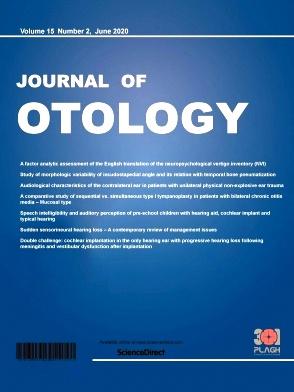Diverse phenotype of Ménière's disease associated with family history, thyroid disorder, migraine and associated disorders
IF 1.4
Q2 OTORHINOLARYNGOLOGY
引用次数: 0
Abstract
Objective
To better understand the clinical phenotype of Ménière's disease (MD), we examined family history, thyroid disorder, migraine, and associated disorders in complaints of people living with MD.
Method
We designed the study as a retrospective and examined data gathered from 912 participants with MD. Their data were originally collected by the Finnish Ménière Federation (FMF). The survey data included individual case histories for environmental factors, comorbidities, disease-specific complaints, impact-related questions, cognitive complaints, health-related quality of life (HRQoL), and sense of coherence (SOC).
Results
We observed significant differences between those with and without sporadic occurrence, family history, thyroid disorder, and migraine-associated complaints. Family history explained 20% of variability in patient complaints. Patients with a family history of MD whose disease started at younger age experienced balance problems, more severe vertigo spells, more severe vestibular drop attacks (VDA), and less nausea, although they had good SOC. Thyroid disorder explained 14% of variability in patient complaints. MD patients with a thyroid disorder comorbidity suffered more often from constant dizziness, balance problems, greater impact of hearing problems, cognitive complaints, and poor HRQoL. Migraine explained 12% of variability in patients’ complaints and was associated with poor SOC and cognitive balance problems. MD patients with both thyroid disorder and migraine used antidepressants more often than other groups. Logistic regression analysis showed comorbidities of ischemic brain disorder (among 7.1%), kidney insufficiency (among 1.2%), and diabetes (among 7.3%) had statistically significant but restricted association with balance and gait problems, VDA, and reduced HRQoL.
Conclusions
Family history of MD and thyroid disorder or migraine comorbidities in MD influence the complaint pattern and partially explain complex symptom profiles, including symptoms of cognitive problems. Confounders play a minimal role in complaint profile and impact of MD whereas comorbidities influence the complaint structure and partly explain the complex symptom profile in MD.
与家族史、甲状腺疾病、偏头痛及相关疾病相关的msami病多样表型
目的:为了更好地了解m懊悔病(MD)的临床表型,我们研究了m懊悔病患者的家族史、甲状腺疾病、偏头痛和相关疾病。方法:我们设计了一项回顾性研究,并检查了912名MD患者的数据。他们的数据最初由芬兰m懊悔病联合会(FMF)收集。调查数据包括环境因素、合并症、疾病特异性投诉、影响相关问题、认知投诉、健康相关生活质量(HRQoL)和连贯感(SOC)的个人病史。结果:我们观察到有和没有散发性、家族史、甲状腺疾病和偏头痛相关投诉的患者之间存在显著差异。家族病史解释了患者投诉中20%的差异。有MD家族史且发病年龄较轻的患者会出现平衡问题、更严重的眩晕期、更严重的前庭下降发作(VDA)和更少的恶心,尽管他们有良好的SOC。甲状腺疾病解释了患者主诉中14%的变异性。伴有甲状腺疾病共病的MD患者更常出现持续的头晕、平衡问题、更大的听力问题影响、认知问题和较差的HRQoL。偏头痛解释了患者抱怨中12%的变异性,并与SOC差和认知平衡问题相关。同时患有甲状腺疾病和偏头痛的MD患者比其他组更常使用抗抑郁药。Logistic回归分析显示,缺血性脑疾病(7.1%)、肾功能不全(1.2%)和糖尿病(7.3%)的合并症与平衡和步态问题、VDA和HRQoL降低有统计学意义,但相关性有限。结论:MD和甲状腺疾病或偏头痛合并症的家族史影响MD的主诉模式,部分解释了复杂的症状特征,包括认知问题的症状。混杂因素在MD的主诉特征和影响中起最小作用,而合并症影响主诉结构并部分解释MD的复杂症状特征。
本文章由计算机程序翻译,如有差异,请以英文原文为准。
求助全文
约1分钟内获得全文
求助全文
来源期刊

Journal of Otology
Medicine-Otorhinolaryngology
CiteScore
2.70
自引率
0.00%
发文量
461
审稿时长
18 days
期刊介绍:
Journal of Otology is an open access, peer-reviewed journal that publishes research findings from disciplines related to both clinical and basic science aspects of auditory and vestibular system and diseases of the ear. This journal welcomes submissions describing original experimental research that may improve our understanding of the mechanisms underlying problems of basic or clinical significance and treatment of patients with disorders of the auditory and vestibular systems. In addition to original papers the journal also offers invited review articles on current topics written by leading experts in the field. The journal is of primary importance for all scientists and practitioners interested in audiology, otology and neurotology, auditory neurosciences and related disciplines. Journal of Otology welcomes contributions from scholars in all countries and regions across the world.
 求助内容:
求助内容: 应助结果提醒方式:
应助结果提醒方式:


